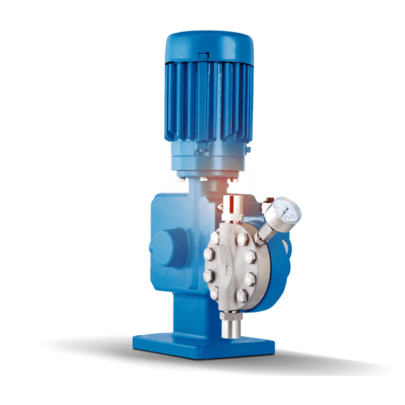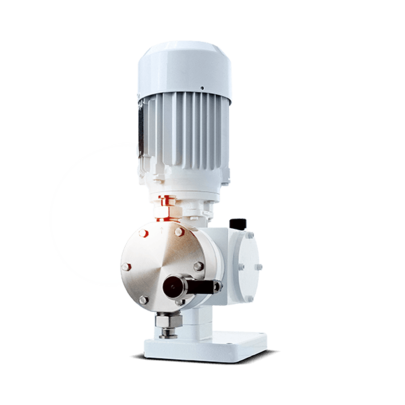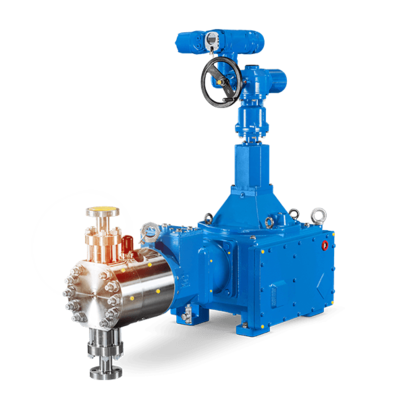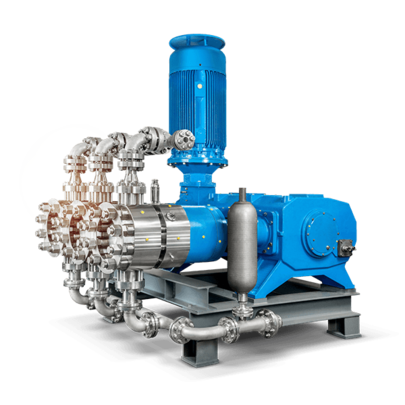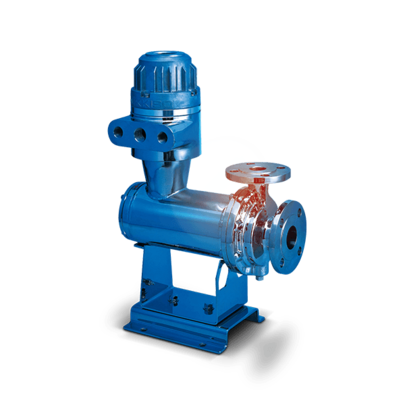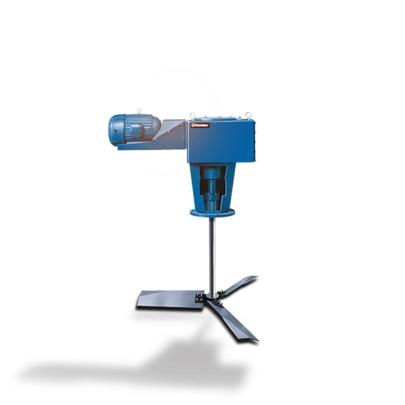Solution
LEWA pumps are used in a wide variety of processes for the production of biodiesel and other biofuels.
Depending on the particular application, different pumps that optimally meet the respective requirements are used:
- Conventional process for producing biodiesel with LEWA ecosmart pumps for metering of additives (up to 300 l/h, up to 80 bar, ambient temperature)
- Alternative process for producing synthetic fuels with LEWA ecoflow or LEWA triplex as high-temperature process pump for increasing reactor pressure (15 m³/h, up to 250 bar, up to 350 °C)
- Esterification of organic fats or oils with methanol in the high-pressure process with LEWA triplex, process pump as feed pump for oil or methanol, (100 to 2400 l/h, up to 250 bar, up to 100°C)
- Thermal decomposition of organic waste with a LEWA metering pump as feed pump for biomass (100 l/h, up to 320 bar), ambient temperature and a recirculation pump (250 bar, 350 °C)
- Newly developed synthesis process for the Bioliq® pilot system at KIT Karlsruhe with various LEWA metering pumps and high-temperature pumps
Areas of application
LEWA pumps in various processes for biofuel production:
Illustration
Process description
Process
Alternative process for synthetic fuel production:
Gasification of carbon-containing raw materials for the production of synthetic gas (CO+H2), which is subsequently converted into a long-chained fuel using Fischer-Tropsch synthesis. In the last process step (hydrocracking), the desired BTL fuel (synfuel) is generated at temperatures < 200°C and a process pressure up to 90 bar.
For more information about this, visit: www.bioliq.de
High pressure 2nd generation
Background
The use of biofuels offers significant advantages in comparison to fossil energy sources:
- Environmentally friendly by reducing CO2 emissions in accordance with the Kyoto Protocol
- Excess capacities of industrial agriculture can be used sensibly
- Political independence from oil states, global availability of the raw material
- Can be used with current and future engine technology, because production of a synthetic fuel can be "customized"
Biofuel production 1st generation:
Vegetable-oil-based fuels
| Source | Fuels | Targets |
|---|---|---|
Oil-bearing plants from agriculture production:
|
|
|
Biofuel production 1st generation:
Bioethanol:
| Source | Fuels | Targets |
|---|---|---|
Renewable resources
|
|
|
Biofuel production 2nd generation:
Synthetic fuels (synfuels):
| Source | Fuels | Targets |
|---|---|---|
Gasification of renewable resources, biogenic and renewable residual materials:
|
|
|
Biofuel production 3rd generation:
Hydrogen
| Source | Fuels | Targets |
|---|---|---|
| From biomass through thermochemical and microbiological processes as well as from electrolysis, powered by photovoltaic systems and wind power plants. |
|
|
Legend:
| Term | Description |
|---|---|
| Biofuels: Synfuels: BTL: GTL: CTL: CNG: LPG: ETBE: FAME: RME: | Renewable fuels and propellants Designer fuels Biomass to liquid Gas to liquid Coal to liquid Compressed natural gas Liquefied petroleum/propane gas Ethanol tertiary butyl ether Fatty acid methyl ester Raps methyl ester |
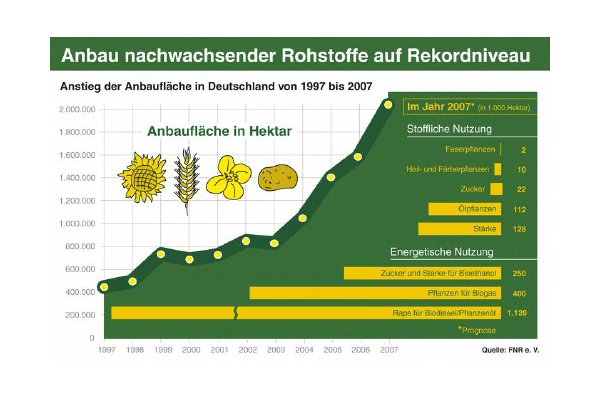
Industries
Pumps and Metering Systems for Distillation Plants and Applications in Refineries
Crude oil must be cleaned, separated, and converted (refined) until the final products suitable for sale are made (e.g., gas, diesel, heating oil, lubricants, propane, butane). LEWA supports you with pumps and metering systems, which are used in the refining process during chemical metering. Application with our products are distillation plants, coker, cracker, or visbreaker, for example. Ask our experts for more information!
More DetailsMetering Packages and Pumps for Power Plants and Power Suppliers
LEWA supports power plant operators and power suppliers with pumps and systems for conveying, metering, and mixing different fluids. We not only provide power plants with our products, but also develop solutions for wastewater treatment plants, gas bottlers, biogas producers, regional power suppliers, and hydrogen producers.
More DetailsProducts
LEWA ecoflow® diaphragm metering pump
LEWA ecoflow is the innovative and universal metering pump with DPS diaphragm protection system in a tried-and-tested modular system. Suitable for numerous applications, the ecoflow is our real all-around talent, relied on by customers from all industries.
More DetailsLEWA ecosmart® diaphragm metering pump
LEWA ecosmart is an innovative, compact and multiplexing diaphragm metering pump at a smart price. With it, we of course guarantee our renowned LEWA quality and offer you our expertise derived from 70 years in the market.
More DetailsLEWA ecodos® mechanical diaphragm metering pump
LEWA ecodos is an absolutely reliable, economical and highly adaptable metering pump, especially where diaphragm actuation is not wanted. Here, we also rely on our tried-and-tested modular system in designing the perfect pump for you.
More DetailsLEWA ecodos® sanitary/hygienic diaphragm metering pump
A sanitary/hygienic version is also available for the LEWA ecodos. Here, we meet all requirements for operation in pharmaceutical and food production.
More DetailsLEWA ecoflow® process pumps for high-pressure applications
The innovative ecoflow diaphragm process pump shows its strengths in high-pressure applications in the oil and gas, refinery and petrochemical industries as well as in the sensitive areas of pharmaceuticals, biotechnology, food and beverage production.
More DetailsLEWA triplex® process pumps for high-pressure processes
The LEWA triplex process diaphragm pump is among the world's most compact high-pressure pumps and can even be set up in the tightest spaces when space is at a premium. The power package has proven its strength in numerous high-pressure processes in a variety of industries. Oil and Gas icon Gas odor icon gray Refinery icon Petrochemicals icon Chemicals icon Plastics icon gray Cleaning icon Cosmetics icon Pharma icon Food icon Energy icon Other icon
More DetailsNIKKISO NON-SEAL canned motor pump
The NIKKISO NON-SEAL canned motor pump has been designed specifically for the chemical industry. To do this, the centrifugal pump is designed in accordance with API 685.
More DetailsChemineer Mixing technology
Chemineer agitators cover a wide range of products. From turbine agitators to impellers, these agitators can be used in almost any process that requires liquid or gas agitation.
More Details










